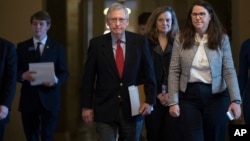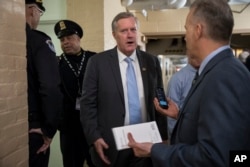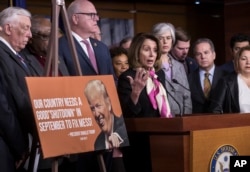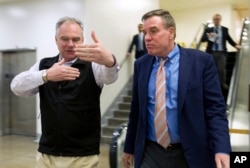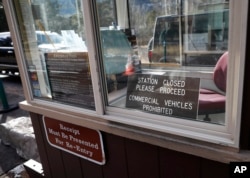Blaming each other for the political deadlock, Republican and Democratic lawmakers closed the first day of a partial shutdown of the U.S. government with few signs of agreement on a spending bill tangled in a fight over immigration.
Senate Majority Leader Mitch McConnell said Saturday night he had scheduled a vote for 1 a.m. Monday on a new spending bill that would keep the government open until Feb. 8. The vote puts pressure on Senate Democrats to reach an agreement or risk voting down a government spending bill for the second time.
Spending authority expired at midnight Washington time Friday, triggering a halt of non-essential functions.
Lawmakers are at odds over a range of defense spending and immigration issues, including a legislative fix for nearly 800,000 undocumented young people brought to the U.S. as children.
Senators resumed debate Saturday afternoon on a temporary spending bill that would fund the government through Feb. 8. Democratic Senator Tammy Baldwin, however, objects to the continuing series of temporary spending bills, saying it “simply kicks the can down the road and fails to get the job done for the American people.”
'Looks like a mess'
Republican Senator Lindsey Graham Tweeted Saturday afternoon, “I know it looks like a mess — but there are many senators of good will who want to solve the problem.” Graham thanked Democratic Senators “commitment to hard work and finding solutions last night.”
Senators marked the first day of the shutdown shuttling back and forth among each others’ offices in the hopes of hammering out a deal.
The U.S. House of Representatives stayed in session Saturday, voting on a rule that would allow the body to quickly consider any newly negotiated legislation sent over from the Senate. The House was set to return to work Sunday in the event the Senate reached a compromise.
“The President will not negotiate on immigration reform until Democrats stop playing games and reopen the government,” White House Press Secretary Sarah Huckabee Sanders said in a statement Saturday afternoon.
The White House and Congressional Republicans blamed Democrats for what it called the “Schumer Shutdown,” accusing legislators of valuing illegal immigrants ahead of lawful Americans.
“Mr. Schumer is going to have to up his game a little bit and be a little bit more honest with the president of the United States if we’re going to see progress on that front,” OMB Director Mick Mulvaney said in a White House briefing Saturday afternoon.
Federal agencies, meanwhile, prepared to idle employees and halt major portions of their operations.
Democrats backed three previous short-term spending extensions late last year while bipartisan negotiations went forward on immigration and spending priorities. Last week, Trump rejected a bipartisan Senate immigration proposal, throwing congressional negotiations into disarray.
The U.S. government has shut down before, including in 2013, in a partisan deadlock over health care policy and funding. The shutdown lasted 16 days and furloughed hundreds of thousands of federal workers.
What stops and what continues during a federal shutdown varies, but federal research projects could be stalled, national parks closed, tax refunds delayed, processing of veterans’ disability applications delayed, and federal nutrition programs suspended, as was the case in 2013.





